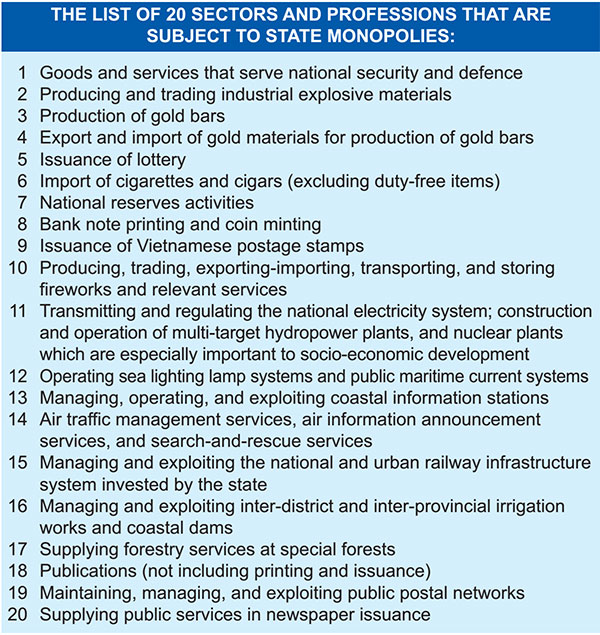State monopoly bill deemed
“regressive”
The Ministry
of Industry and Trade’s new draft decree on goods, services, and localities
subject to state monopolies has received barracking from local and
international experts.
The Ministry
of Industry and Trade (MoIT) has submitted to the government a draft decree
on goods, services, and localities subject to state monopolies. The draft
includes a controversial list of 20 sectors and professions subject to state
monopolies (see box).
Sesto
Vecchi, managing partner of the US law firm Russin & Vecchi, questioned
the list. “Why is MoIT creating new monopolies? No justification is provided
and the justification is not self-evident,” Vecchi told VIR.
He said that
even when state participation can be justified, in many cases, the private
sector may also contribute in some sectors like irrigation, hydro plants,
power distribution, and the importation of cigarettes and cigars.
“The state
is only one of several stakeholders. The draft appears regressive as the
private sector already participates in some named sectors. Would the monopoly
remove their participation?” argued Vecchi.
Tran Trong
Binh, senior attorney from Hanoi-based French law firm Audier and Partners,
told VIR that such a list is “irrational”, and if it is approved, it will
“vex” the market, which is now required to be more transparent, with less
state monopolies, especially in the context of Vietnam’s deeper international
integration.
“The draft
decree has gone against the Constitution adopted in 2013, which states that
enterprises are allowed to do business in the sectors not banned by law, and
also against the laws on Investment and Enterprises issued in 2015,” Binh
said. “While the government is boosting the establishment of start-ups and
restructuring state-owned enterprises (SOEs), this new document will
undermine the market’s competitiveness by preventing private investors from
investing in many sectors on the list.”
The Law on
Commerce 2005 stipulates that the government shall specify a list of goods,
services, and localities subject to state monopolies. This specific list has
taken 12 years to create.
“I don’t
understand why the draft decree is now being made. It should have been
enacted 12 years ago. And now such a decree is unsuitable to Vietnam’s
development,” said Nguyen Dinh Cung, head of the Central Institute for
Economic Management. “Who will take responsibility for such a delay?”
According to
Cung, many of the sectors prescribed in the list should not be banned and can
be engaged in by private firms. The state should hold a monopoly over some
sensitive sectors only, such as electricity transmission or railways, so that
access to these services can be ensured.
MoIT
responded to the negative reactions to the draft decree by stating that the
decree is built to fulfil the Law on Commerce 2005, which allows the state to
monopolise for a given period of time the trading in a number of goods and
services in certain localities in order to protect national interests.
“The list is
aimed to help enhance the systemisation and transparency of all goods,
services, and geographical areas that are subject to state monopolies in
commercial activities in line with Vietnam’s international commitments, and
existing policies and regulations,” said an MoIT document released last week
to explain the issuance of the draft decree.
“The list
also acts as a foundation for state management bodies and other entities in
society to perform their supervision over state monopolies in the listed
sectors.”
But Dau Anh
Tuan, head of Vietnam Chamber of Commerce and Industry’s Legislation
Department, said that the reasoning behind MoIT’s enacting the list is
“unpersuasive”.
“In the
list, it is likely that some sectors will find it difficult to lure the investment
of private firms, such as public goods and services,” Tuan said. “Under
existing regulations, these sectors are sill engaged in by some private firms
as they are not monopolised by the state.”
By Thanh Dat, VIR
|
Thứ Bảy, 18 tháng 2, 2017
Đăng ký:
Đăng Nhận xét (Atom)

Không có nhận xét nào:
Đăng nhận xét